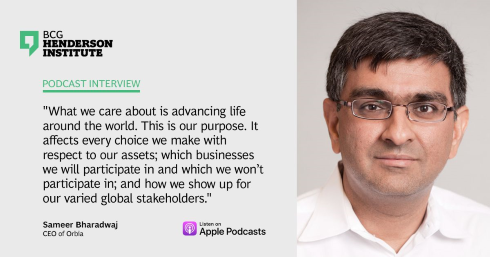The Boston Consulting Group (BCG) hosted Orbia CEO Sameer Bharadwaj on a podcast with leader Dave Young of BCG’s Henderson Institute Center for Climate and Sustainability. In the conversation, Bharadwaj highlighted Orbia's approach to embedding sustainability into its business model and leveraging its diverse portfolio to accelerate a net-positive world.

During the episode, Bharadwaj chronicled the company’s growth journey from a $200 million Mexican chemicals company known as Mexichem only 20 years ago to a $8.2 billion global solutions company as of 2023. In 2019, Bharadwaj and company leaders launched a new company identity to reflect Mexichem’s trajectory and growing footprint. “Orbia” was born with a common purpose to advance life around the world, a strategy revolving around sustainable growth and innovation and an organization of five business groups united in tackling tough global challenges.
When describing Orbia’s origin story, Bharadwaj shared that, “[Our Board and shareholders] went through the exercise with us to crystallize our purpose. They have a long-term mindset: not just driven by quarterly earnings but also by investing in a future worth inheriting.”
Bharadwaj underscored how today, Orbia’s five business groups are pioneering solutions that address three major Sustainable Development Goal (SDG)-aligned challenge areas: food and water security, decarbonization and the energy transition and connectivity and information access. With sustainability anchoring every business decision, he described how each of the company’s businesses contribute to a healthier planet and thriving citizenry.
Food and Water Security
- Orbia Polymer Solutions is a world leader in the manufacturing of PVC and specialty PVC. As Bharadwaj elaborated, these compounds are low-cost, long-lasting, recyclable and biocompatible polymers that have half of the carbon footprint of substitute materials; can be responsibly disposed of to sequester carbon and are superior options for the pipes, fittings and water management systems used to deliver clean water worldwide, among other essential applications.
- Integrated with Orbia Polymer Solutions, Orbia Building & Infrastructure offers water management and sanitation solutions, indoor climate systems and urban climate resilience solutions that serve large populations in regions impacted by climate instability and natural events. From tree bunkers to blue-green roofs; smart plastic roads to stormwater management and indoor systems, Bharadwaj highlighted where and how the group is building healthy and efficient environments.
- With roots extending back 50 years, Orbia Precision Agriculture invented and now leads the world in drip irrigation technology that allows farmers to conserve water, energy, fertilizer and labor while increasing crop yields. Bharadwaj noted the opportunities to be realized in large-scale crops to feed a growing population and the group’s carbon credit pilot program now underway for drip-irrigated rice: a game-changer with substantial incentives for global growers.
Decarbonization and the Energy Transition:
- With the world’s largest fluorspar mine and holdings of 20% of global fluorine reserves, Orbia Fluor & Energy Materials is leading in the production of fluor-based materials, including next-generation refrigerant gases and medical-grade propellants with up to a 90% reduction in global warming potential (which can contribute to the company’s scope 3 emissions reduction goal of 30% by 2030). In discussing the broadening opportunities inherent in the global energy transition, Bharadwaj shared that the group’s work in advanced materials for lithium-ion batteries as well as semiconductors positions Orbia as the only company that can secure the fluorine supply chain outside of China, meet demand for lithium-ion materials by the end of the decade and lead the way in battery recycling.
Connectivity and Information Access:
- Orbia Connectivity Solutions leads in the development of passive network infrastructure for telecommunications, including conduits for fiber optic cables that extend broadband access and connectivity to all. Integrated with Polymer Solutions, Bharadwaj explained that the group’s products are created from high-density polyethylene (HDPE) and provide environmental benefits including durability, non-leaching qualities and resistance to leaks and corrosion. In addition, the group designs with a “dig once” philosophy that accounts for future capacity, efficient resource use and minimal environmental disruption.
The episode concluded with Bharadwaj’s perspective on Orbia’s orientation towards the future.
He closed with, “If you try to do the right thing, there is a business case and a sustainability case. If you take a long view—a five-, ten-, twenty- or thirty-year view—on water, food, enabling the energy transition and connectivity, there will always be need and demand even as there will be ups and downs. In Orbia’s case, we believe that staying committed to our long-term goals as well as maintaining our commitment to profitable growth and a strong balance sheet will bring success and bring about a better world.”
Listen to the full episode here: https://bcghendersoninstitute.com/leadership-in-sustainability-how-orbia-tackles-global-challenges/
